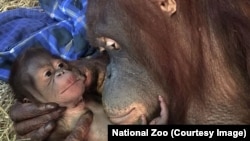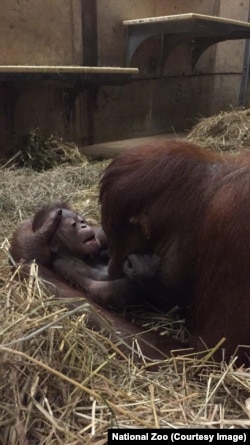This is What’s Trending Today:
Happy News!
For the first time in 25 years, a baby orangutan was born at the National Zoo in Washington, D. C. Zoo officials say they are “cautiously optimistic” that the baby boy will survive and thrive—or do well.
The Zoo posted video of the baby “vocalizing” or making sounds to his mom, Batang. She is holding him gently and looking at him closely.
His birth is important because he is part of a critically endangered species.
In one photo that the zoo posted, the baby is seen looking at his mother’s face. He was only one hour old.
The newborn’s parents are female Batang and male Kyle. Both orangutans are 19 years old.
The zoo’s animal care staff has observed Batang nursing her infant, who has been keeping close to his mother.
The zoo provided updates of Batang’s pregnancy on Facebook, Twitter and Instagram, using the hashtag #OrangutanStory. As news breaks, they will continue to share behind-the-scenes photos and videos with the public.
Orangutans have long orange- or reddish-color hair. The hair grows unevenly on their bodies. They have large jaws, flat noses and their faces curve inward.
Their arms are much longer than their legs, which helps them swing through the forests where they live in the wild. They grasp with their hands and feet. They share almost 97 percent of the same DNA as humans. They are highly intelligent.
Orangutans are listed as critically endangered, mostly because of habitat loss. Their population has dropped more than 50 percent over the past 60 years.
“Each and every birth of a critically endangered species is significant, but it is all the more exciting, and this is a historic moment for our Smithsonian’s National Zoo,” said Meredith Bastian, curator of primates.
Zookeepers have been training Batang to care for her infant for the last several years. They taught Batang how to safely hold a new baby by using a toy.
So far, it seems, all is going well for mom and baby boy.
And that’s What’s Trending Today.
I’m Anne Ball.
We want to hear from you. Write to us in the Comments Section and visit us on our Facebook page.
Words in This Story
cautiously - adv. careful about avoiding danger or risk
optimistic - adj. having or showing hope for the future : expecting good things to happen
grasp - v. to take and hold (something) with your fingers, hands, etc.






